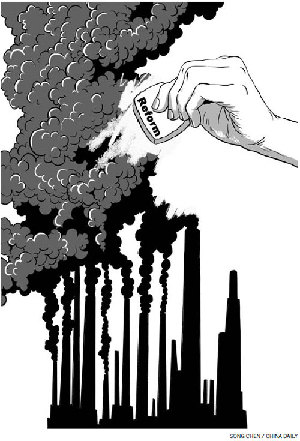Green dream for China's reforms
- By Ayumi Konishi
 0 Comment(s)
0 Comment(s) Print
Print E-mail China Daily, November 26, 2013
E-mail China Daily, November 26, 2013
The Third Plenary Session of the 18th Communist Party of China Central Committee was CPC General Secretary Xi Jinping's first opportunity to present his comprehensive strategic vision for China's socio-economic reform for the next decade.
 As we hoped (see our earlier commentary on China Daily on Nov 4), the plenum indeed reaffirmed the Chinese leadership's commitment to balance and sustain economic growth to build a moderately prosperous society by 2020. The Leading Group for Comprehensively Deepening Reform has been tasked with designing the reforms, and coordinating and supervising their implementation. We at the Asian Development Bank appreciate the essential role the Leading Reform Group will play in light of the implementation challenges that could emerge from the complexity of the announced reforms. In this regard, determining the optimal sequence of the reform path will be crucial for successful implementation.
As we hoped (see our earlier commentary on China Daily on Nov 4), the plenum indeed reaffirmed the Chinese leadership's commitment to balance and sustain economic growth to build a moderately prosperous society by 2020. The Leading Group for Comprehensively Deepening Reform has been tasked with designing the reforms, and coordinating and supervising their implementation. We at the Asian Development Bank appreciate the essential role the Leading Reform Group will play in light of the implementation challenges that could emerge from the complexity of the announced reforms. In this regard, determining the optimal sequence of the reform path will be crucial for successful implementation.
The plenum's outcome indicates that economic development remains China's central objective and is vital to its national development and social stability. More specifically, the country's leadership pledged to embark on reforms to develop a modern taxation system, assign a decisive role to the market in the economy, narrow income inequality, establish a unified land market to narrow the urban-rural divide, foster urbanization, introduce a sustainable social security system, and liberalize the financial sector.
Moreover, it has been stressed that economic development requires greater environmental protection to realize an ecological civilization. The ADB welcomes the plenum's reiteration of the country's firm commitment to economic restructuring, inclusive growth and environmental protection. The ADB's operational priority in China is consistent with this vision, because it, too, focuses on inclusive development and environmental sustainability. We particularly appreciate the emphasis on the concept of ecological civilization, which is understood to be the key to balancing economic development while protecting the environment for the sake of the country's and the rest of the world's future.
At this point of China's economic development, strong commitment to environmental sustainability is essential to curb escalating costs associated with resource depletion and environmental damage. China should avoid the mistakes made by most industrialized countries, which damaged the environment in their pursuance of industrialization and still struggle to restore what has been lost.
To that end, existing plans to develop new pricing mechanisms for natural resources, and establishing carbon emission and water rights norms through pilot projects, and introduction of a new environmental tax, ought to be accelerated to help the economy move toward green growth before it is too late.





